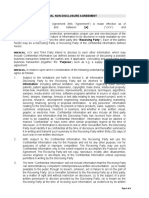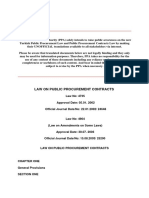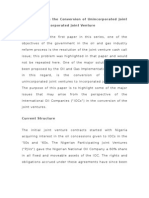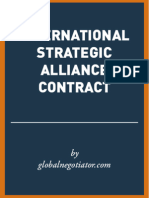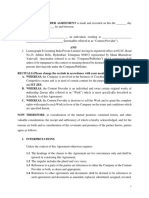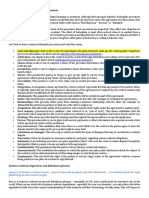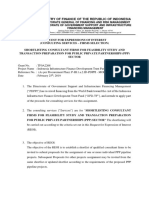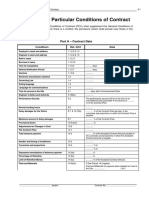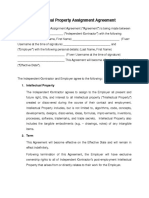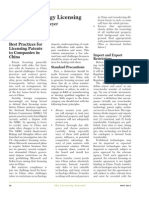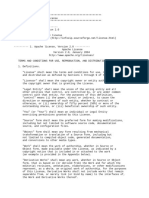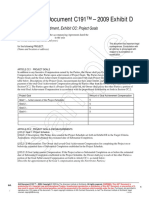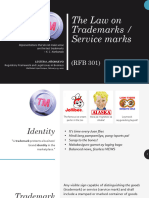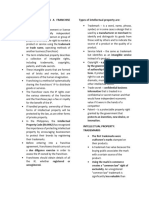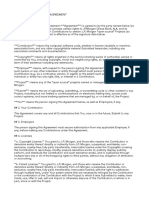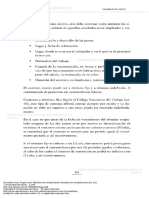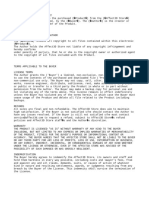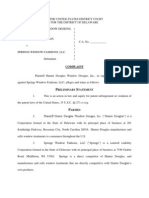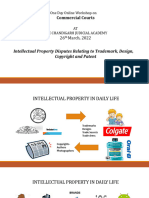Technology Agreements in China
Technology Agreements in China
Uploaded by
Deborah DuganCopyright:
Available Formats
Technology Agreements in China
Technology Agreements in China
Uploaded by
Deborah DuganOriginal Description:
Copyright
Available Formats
Share this document
Did you find this document useful?
Is this content inappropriate?
Copyright:
Available Formats
Technology Agreements in China
Technology Agreements in China
Uploaded by
Deborah DuganCopyright:
Available Formats
TECHNOLOGY AGREEMENTS
IN CHINA
Protecting Your Intellectual Property Rights
Introduction
IP licensing and other technology transfer agreements in
China are governed by many Chinese laws, regulations
and official pronouncements including, but not limited to,
Contract Law, Patent Law, Unfair Competition Law,
Foreign Trade Law, Antitrust Law, Administration of
Technology Imports and Exports Regulations (TIER) and
Judicial Interpretation on Litigation Issues Relating to
Technology Contract Disputes.
A technology contract is invalid if it includes terms that are
contrary to the mandatory provisions of Chinese laws and
regulations. Under Chinese law, technology contracts
that are contrary to the mandatory provisions of law and
regulations are invalid; they could be void entirely or
unenforceable, with respect to the offending provisions.
Wide Range of Transactions are Subject to
Regulatory Restrictions
Patent / patent application assignments
Patent licenses
Know-how or trade secret assignments
Technical services contracts
Research & development contracts
Technology consultancy contracts
Technology training contracts
Technology brokerage transactions
Technology import/export transactions
Administration of Technology Import/Export
Regulations (TIER)
Regulates act of transferring technology from
outside territories to China/ transferring
technology from China to outside territories
(Article 2 TIER)
Transferring technology, includes:
Assignment of patent rights and know-how;
License of patented technologies and
know-how
TIER Classifies Technologies into Three
Broad Categories:
Prohibited Technologies: technologies that cannot be
imported into or exported out of China
Restricted Technologies: technologies that must be
approved by the relevant governmental authority before
import or export, and the relevant technology transfer
agreement must be submitted to the relevant governmental
authority
Permitted Technologies: technologies that can be
imported into or exported out of China without prior
governmental approval, but the parties need to register the
agreement with the relevant governmental authority. While
the failure to register an agreement does not affect the
validity of the agreement, other adverse consequences may
result; for example, the inability of a Chinese licensee to
convert royalty payments into foreign exchange to make
payment to the licensor
Administration of Technology Import/Export
Regulations (TIER)
TIER Provides that a Technology Import Contract Cannot
Contain Provisions that Allow, Among Other Things:
Purchase of unnecessary technology and/or equipment
Payment for expired or invalid patents
Restrictions on the Licensees ability to improve technology or
to use the improved technology
Restrictions of the Licensees ability to acquire similar or
competing technology
Unreasonable restrictions on equipment/material resources
Unreasonable restrictions on production volumes, models and
sales price
Unreasonable restrictions on export channels for products
made with licensed technology
Supreme Court Judicial Interpretation Specifies the Following
Contractual Terms as Illegal Monopoly and Impeding
Technological Progress:
Restricting new R&D on the basis of licensed technology
Limitations on further improvement of licensed technology
Limitations on use of improved technology
Unfair exchange conditions on improved technology, such as
grant-back of improved technology without compensation; nonreciprocal transfer of improved technology
Limitations on Licensees reasonable exploitation of licensed
technology according to market demand, such as unreasonable
restriction on sales quantity, type, price, channel and export
Tie-ins
Prohibitions or restrictions on Licensees ability to challenge the
validity of the licensed IP
Contract and Antitrust Laws
Article 329 of the Chinese Contract Law voids a
contract that illegally monopolizes technology, impedes
technological progress or infringes on another persons
technology
Article 55 of the Chinese Antitrust Law applies if
license agreement eliminates or restricts market
competition by abusing IPRs stipulated in the relevant IP
laws and administrative regulations
Contract Provisions and Contracts for specific
types of Intellectual Property Rights (IPRs)
Using the right provisions and contracts for your specific IPR
is key to protecting them.
Trade Secret is defined as any non-public technical or
business information with commercial value that is guarded
by confidentiality measures
Confidential information, on the other hand, generally
refers to any non-public information pertaining to a
companys business, and is therefore broader in scope than
trade secret. However, no protection is afforded to
confidential information under Chinese law, unless it falls
within the scope of trade secrets, or is otherwise specified in
a contract
NDA non-disclosure and non-use
NNN - non-disclosure, non-use and non- circumvention (typically used in
source and manufacturing contracts)
10
Important Contract Provisions to INCLUDE
Definition of licensed rights
Monitoring of the licensees activities: Prevent
unauthorized use of the licensed rights
Challenges of validity: Ensure the validity of your
agreement
Include clauses on the severability of validity of the
license agreement
This will ensure that even if one or more of the
licensed rights in the agreement expires, the
validity of the entire agreement and the license
granted within that agreement may not be
challenged
11
Protection of New IP Generated:
Address Ownership Issues
Under Chinas Patent Law, the party who makes
improvements to a technology based on the licensed
patent or technology automatically owns the IP on such
improvements
The licensee can enter into a separate agreement to
assign or license its rights to the improvements back to
the licensor
However, if the technology covered in the improvements
falls into the prohibited for exportation category as outlined
in the official guide, Chinas Ministry of Commerce will not
approve such a transaction, and the improvements will not
be granted back to the licensor
12
Dealing with Improvements: Be Equitable or
Provide Consideration
During the term of the license, improvements
technology shall belong to the party that made
the improvement (Article 27 TIER)
No automatic grant-back permitted
Compensation required; or
Reciprocation (such as granting license)
Cannot restrict licensee from making
improvements to technology (Article 29 TIER)
13
Assignments or Transfers
No Registration No Contract:
Article 10 of Chinese Patent Law states if a Chinese
company assigns one of its Chinese patents to a foreign
company, the written assignment does not become effective
until the assignment has been approved and registered by
the State IP Office of China (SIPO). Parties to a patent
licensing contract are required to apply for recordal within
three months of the effective date of the contract
SIPO will issue its decision that a patent licensing contract
may be recorded within seven days of receiving the
application
Patent assignment takes effect upon recordal with registry
Assignments and licenses by a Chinese Licensee to a
foreign Licensor will be subject to export control regulations
14
Statutory Representations and Warranties:
Guarantee your Technology is Fit for Transfer
Licensor must warrant it is the lawful owner of the
subject technology, with the rights to license such
technology (Article 24 TIER)
Licensor must undertake responsibility for thirdparty infringement claims (Article 24 TIER)
Licensor must undertake responsibility for harm
to lawful interests of others (Article 24 TIER)
Licensor must warrant that technology provided is
complete, error-free, effective and capable of
achieving its intended purpose (Article 25 TIER)
15
Confidentiality: Statutory Confidentiality Term
Licensee to keep trade secrets and know-how
received from licensor confidential during the
term of the contract (Article 26 TIER)
Government employees for examining and
registering technology contracts have an
confidentiality obligation
16
Confidentiality: Statutory Confidentiality Term
Contractual confidentiality obligation
May contractually stipulate scope and duration
Consider the useful lifetime of the confidential
information
Try to bind affiliates and employees of the other party to
the same terms
Disclose to employees only on need to know basis
Define clearly what constitutes confidential information
from all perspectives: technical, legal and business
Preparation of derivative works (i.e., translations,
summaries)
Need to track derivative works that are created
Such works should be owned by the owner of the
confidential information
17
Dispute Resolution: Choice of Law
Agreement should specify the law that governs the disputes
of the agreement (in this case, foreign law or Chinese law),
along with the chosen methods of dispute resolution.
It is important to note, however, that while disputes on the
performance and interpretation of the contract in general
can be governed by foreign law, in reality, if the
agreement is to be enforced in China, certain provisions
of Chinese law (e.g., IP rights) are mandatory and,
therefore, the agreement should, as a general rule, be
governed by Chinese law.
If your contract adopts arbitration or other non-judicial
methods of dispute resolution, it is also important to include
a clause that permits you to file in courts where you can
seek injunctive relief or claim damages against IP
infringement.
18
Dispute Resolution: Language
If the agreement is executed in both English and Chinese, the
agreement should specify ONE official language to control if
there is a dispute. It is neither advisable to draft a contract that
is silent on the official language, nor to draft contracts that call
for both English and Chinese to apply
Whether English or Chinese should be the official language
of the contract? It depends.
Consider where you would most like to see disputes
resolved.
If arbitration in English then you almost certainly will want
English as the official language
But if the Chinese courts will be the best place to resolve
conflicts, then Chinese should be the official language
19
Dispute Resolution: Enforcement
While a judgment from a foreign court is effective
against a Chinese company that has
assets/operations in the foreign venue
Enforcement of the judgment against a Chinese
company that does not have assets/operations in
the foreign venue will be difficult; the foreign
company must then obtain recognition and
enforcement of its foreign court judgment in China.
*Alternative Arbitration Venues: SIAC (Singapore) and
HKIAC (Hong Kong)
20
Dispute Resolution: Enforcement
To increase chances of having an agreement that will
actually be enforced, the following steps may be
considered:
The agreement should include an accurate translation into
the Chinese language
The agreement should provide for enforcement through
litigation in a Chinese court or through the China
International Economic and Trade Arbitration Commission
("CIETAC")*
Agreement should provide for specific monetary damages
that will be awarded in the case of a breach. Specific
contract damage provisions are encouraged by Chinese
courts since they ease the courts work
21
Dispute Resolution: Enforcement
Avoid relying on injunctive relief as the primary enforcement
mechanism
Under Chinese law, the parties to a contract are
encouraged to set a fixed amount for damages that will
result from a breach. If written correctly, the liquidated
damage amount sets a floor on damages, but if actual
damages exceed that amount, it is permissible to seek
damages for the excess
In addition, money damages and injunctive relief are not
mutually exclusive. A court or arbitrator is free to order
that damages be paid and that the infringing/breaching
party terminate the infringing action
22
Termination: Specify What Happens When
the Agreement Comes to an End
It is necessary to specify when and on what
conditions the agreement will terminate, e.g.,
upon the liquidation or dissolution of one party
You should always include terms on the
consequences of termination; for example, the
licensee shall cease to have access to, or must
return, all the licensed rights, or the licensee shall
destroy or return all inventory bearing the
licensed trade mark to the licensor
23
Take-Away Messages
Tailor your IP contracts to suit the IPR you are
protecting, and make sure you include sufficient
specific detail in the contracts key provisions
Certain IPR protection provisions are unlawful under
Chinese law, and may render a contract void if you
include them in your agreement, so be cautious when
drafting these provisions
Sign an NDA, NNN or ensure that there is adequate
protection in your contract addressing confidentiality
issues
For manufacturing or sourcing in China, consider
signing an NNN agreement to prevent your Chinese
business partner from disclosing your confidential
information or competing with you later
24
Take-Away Messages
Choose the right Chinese partner
Understand the legal and regulatory environment
Put in place the airtight legal agreements
Protect your know-how and trade secrets through
NDAs, NNNs and other practical measures
Keep lines of communications open and clear up
misunderstandings quickly
Carry out regular audits
Have seasoned bilingual on the ground to bridge
cultural and language barriers
You might also like
- Get Mergers and Acquisitions From A To Z Andrew J. Sherman PDF Ebook With Full Chapters NowDocument62 pagesGet Mergers and Acquisitions From A To Z Andrew J. Sherman PDF Ebook With Full Chapters Nowraissowopiwo100% (5)
- IPGA Partnership Contract TemplateDocument9 pagesIPGA Partnership Contract TemplateAdrian NowowiejskiNo ratings yet
- 02 Invitation To Bid Letter - Tender 6621Document3 pages02 Invitation To Bid Letter - Tender 6621Fredrick MuigaiNo ratings yet
- RDIA Technology Transfer BlueprintDocument24 pagesRDIA Technology Transfer BlueprintHamad BadrNo ratings yet
- Business Transfer AgreementDocument26 pagesBusiness Transfer Agreementjacksonko2014No ratings yet
- NZS 2403-2015 - v1-3Document118 pagesNZS 2403-2015 - v1-3Brian ChristiantoroNo ratings yet
- German NDADocument4 pagesGerman NDAGeli Manimtim100% (1)
- Asset Transfer Agreement - Harrisburg Parking Authority 112013 PDFDocument146 pagesAsset Transfer Agreement - Harrisburg Parking Authority 112013 PDFEmily PrevitiNo ratings yet
- Litigating Computer Breach of Warranty CasesDocument12 pagesLitigating Computer Breach of Warranty Casesgesmer100% (1)
- NDA AFCA - The Book AdviserDocument10 pagesNDA AFCA - The Book AdviserMichael CallanNo ratings yet
- Sample Contract - Patent Transfer AgreementDocument13 pagesSample Contract - Patent Transfer AgreementYicheng Qin100% (1)
- Joint Venture AgreementDocument31 pagesJoint Venture AgreementHyunJunLimNo ratings yet
- IP Sale AgreementDocument7 pagesIP Sale AgreementkiranrauniyarNo ratings yet
- Public Works ContractDocument24 pagesPublic Works ContractanasshifanNo ratings yet
- Public Procurement Contracts LawDocument17 pagesPublic Procurement Contracts Lawbbking44No ratings yet
- Consultant Agreement - 23-08-2018Document13 pagesConsultant Agreement - 23-08-2018Abhi ShekNo ratings yet
- BG Raw Material Agreement UpdatedDocument9 pagesBG Raw Material Agreement UpdatedSuman KumarNo ratings yet
- Approvals & SatisfactionDocument12 pagesApprovals & SatisfactionMustafa Sartaj NewNo ratings yet
- Writing Legal Contracts - Full GuideDocument22 pagesWriting Legal Contracts - Full GuideAhmedNo ratings yet
- Paper 4 - The Incorporated Joint Venture Structure As A Panacea To Cash Call IssuesDocument7 pagesPaper 4 - The Incorporated Joint Venture Structure As A Panacea To Cash Call IssuesAdeoye AdefuluNo ratings yet
- Corporate Social Responsibility and Corporate GovernanceDocument7 pagesCorporate Social Responsibility and Corporate GovernancebableenNo ratings yet
- Real Estate Buyer Non Disclosure AgreementDocument2 pagesReal Estate Buyer Non Disclosure AgreementVince Sanchez100% (1)
- Workshop On Contract Drafting and Patent LicensingDocument54 pagesWorkshop On Contract Drafting and Patent LicensingAMRITA KAUTSNo ratings yet
- Technology Transfer Agreements PDFDocument9 pagesTechnology Transfer Agreements PDFAnanya BanerjeeNo ratings yet
- 2015 Jurisdiction ChallengesDocument38 pages2015 Jurisdiction Challengesfaaderinto5964No ratings yet
- International Strategic Alliance Contract SampleDocument11 pagesInternational Strategic Alliance Contract SampleGlobal Negotiator50% (2)
- Copyright Licensing Agreement and The Clauses Covered Under ItDocument6 pagesCopyright Licensing Agreement and The Clauses Covered Under ItSyed ImranNo ratings yet
- Content Provider Agreement LearnographDocument6 pagesContent Provider Agreement LearnographAnonymous RxWzgONo ratings yet
- Expert Determination Clauses in Contracts Providing For International ArbitrationDocument6 pagesExpert Determination Clauses in Contracts Providing For International ArbitrationJúlia de MarckNo ratings yet
- Agreement Between Two Companies For Amalgamation by Sale of One Company To The Other CompanyDocument2 pagesAgreement Between Two Companies For Amalgamation by Sale of One Company To The Other CompanyVinod YadavNo ratings yet
- Technology Transfer in MalaysiaDocument8 pagesTechnology Transfer in MalaysiaqabasssNo ratings yet
- Kornet ''Contracting in China''Document31 pagesKornet ''Contracting in China''Javier Mauricio Rodriguez OlmosNo ratings yet
- The Impact of Social Media On Defamation Laws in IndiaDocument5 pagesThe Impact of Social Media On Defamation Laws in IndiaGurdev SinghNo ratings yet
- Nomination - External Timber Joinery - Banyan Grove - DMIDocument4 pagesNomination - External Timber Joinery - Banyan Grove - DMIDeepum HalloomanNo ratings yet
- Services and Goods ContractDocument25 pagesServices and Goods ContractShachi Pandey TripathiNo ratings yet
- Acquisition AgreementDocument2 pagesAcquisition AgreementKimseonghyunNo ratings yet
- Attorneys' Fees Provisions in Contracts Arbitration Provisions in ContractsDocument9 pagesAttorneys' Fees Provisions in Contracts Arbitration Provisions in ContractsamberspanktowerNo ratings yet
- Project Contract AdministrationDocument44 pagesProject Contract AdministrationBUKENYA BEEE-2026No ratings yet
- CEO VP In-House Legal Counsel in Los Angeles CA Resume Stuart WebsterDocument4 pagesCEO VP In-House Legal Counsel in Los Angeles CA Resume Stuart WebsterStuartWebsterNo ratings yet
- It Support Service AgreementDocument7 pagesIt Support Service Agreementishaan150600No ratings yet
- Boilerplate Clauses: Waiver, Variation and Entire Agreement: Return To AMPLA 2007 Table of ContentsDocument18 pagesBoilerplate Clauses: Waiver, Variation and Entire Agreement: Return To AMPLA 2007 Table of ContentsdilanqsNo ratings yet
- Force Majeure ClausesDocument20 pagesForce Majeure Clauseshuangpeter55No ratings yet
- Public Procurement Audit in African CountriesDocument3 pagesPublic Procurement Audit in African CountriesumboniNo ratings yet
- Caparo V Dickman TestDocument4 pagesCaparo V Dickman TestChristine HoNo ratings yet
- EOI - Feasibility Study Transaction Preparation PDFDocument14 pagesEOI - Feasibility Study Transaction Preparation PDFsofianNo ratings yet
- The Public Procurement Administrative Review BoardDocument6 pagesThe Public Procurement Administrative Review Board1man1bookNo ratings yet
- BUSINESS FINANCIAL ADVISORY SERVICES AGREEMENT v1Document6 pagesBUSINESS FINANCIAL ADVISORY SERVICES AGREEMENT v1Carlos MurilloNo ratings yet
- Contracts Under Qatari LawDocument2 pagesContracts Under Qatari LawJake ElwoodNo ratings yet
- Standard Conditions of Engagement For Consultancy Services (Technical)Document15 pagesStandard Conditions of Engagement For Consultancy Services (Technical)raja vijjayNo ratings yet
- Techno Legal Aspect of FIDICDocument14 pagesTechno Legal Aspect of FIDICShivangi BajpaiNo ratings yet
- Contract Data Fidic MDB 2010 Const2Document2 pagesContract Data Fidic MDB 2010 Const2muslih_mhdNo ratings yet
- Board ApprovalDocument4 pagesBoard ApprovalHerbertNo ratings yet
- SC Draft Concession Agreement (O&M)Document46 pagesSC Draft Concession Agreement (O&M)Geo Designs researchNo ratings yet
- Chapter 26 BLDG and Construction LawDocument17 pagesChapter 26 BLDG and Construction Lawlwin_oo2435No ratings yet
- Contract ManagementDocument4 pagesContract ManagementManish GuptaNo ratings yet
- IP Agreement Trading Algorithm PDFDocument2 pagesIP Agreement Trading Algorithm PDFshakeel ahmadNo ratings yet
- Contract/Agreemen T Procedures FOR Contract AdministrationDocument6 pagesContract/Agreemen T Procedures FOR Contract AdministrationDiana Alexandra ComaromiNo ratings yet
- Equity Commitment LetterDocument59 pagesEquity Commitment LetteralecNo ratings yet
- Best Practices For Licensing Patents To China Entities - WWW - Asialaw.bizDocument3 pagesBest Practices For Licensing Patents To China Entities - WWW - Asialaw.bizChris NeumeyerNo ratings yet
- Technology Transfer and Indian ScenarioDocument5 pagesTechnology Transfer and Indian Scenariodishank.bhatia03No ratings yet
- LICENSEDocument6 pagesLICENSEludwingNo ratings yet
- Mil M8Document5 pagesMil M8Eya Kayte C. ReblandoNo ratings yet
- Copyright and PlagiarismDocument32 pagesCopyright and PlagiarismAlwyn SacandalNo ratings yet
- AIA C191 Exhibit D Exhibit CC 2009 Free Sample PreviewDocument2 pagesAIA C191 Exhibit D Exhibit CC 2009 Free Sample PreviewJaime Mamani CardozoNo ratings yet
- Book 4 - Body at WorkDocument359 pagesBook 4 - Body at WorkRonald RosarioNo ratings yet
- The Law On Trademarks / Service MarksDocument19 pagesThe Law On Trademarks / Service MarksprincessaliahdechavezNo ratings yet
- TrademarksDocument4 pagesTrademarksRich VistaNo ratings yet
- JPMCDocument4 pagesJPMCParminder SinghNo ratings yet
- Mollie MakesDocument124 pagesMollie MakesPaula FernandezNo ratings yet
- John Dowland - FortuneDocument5 pagesJohn Dowland - FortuneMiguel Ángel Ramos Sánchez100% (2)
- IP Considerations in The Outsourcing BusinessDocument17 pagesIP Considerations in The Outsourcing BusinessLawQuestNo ratings yet
- FinQuiz - Curriculum Note, Study Session 2, Reading 5Document1 pageFinQuiz - Curriculum Note, Study Session 2, Reading 5Sankalp Jain0% (1)
- Ipr Syllabus LW 3015Document7 pagesIpr Syllabus LW 3015Mohima DuttaNo ratings yet
- S21 - 102 Scour Valve Installation Pipe Connections Sheet 1 of 3Document1 pageS21 - 102 Scour Valve Installation Pipe Connections Sheet 1 of 3Sol RogowskiNo ratings yet
- Métodos de Compensación Basados en Competencias. 2a Ed. Pág 349 A 367Document19 pagesMétodos de Compensación Basados en Competencias. 2a Ed. Pág 349 A 367rociosanchez1989No ratings yet
- RFR Alpha Lap II FwoDocument12 pagesRFR Alpha Lap II Fwoallan xiongNo ratings yet
- Affect3D Store - End User LicenseDocument1 pageAffect3D Store - End User Licensethomas mcdonnellNo ratings yet
- Introduccion Al Business IntelligenceDocument20 pagesIntroduccion Al Business IntelligenceIsha SchezNo ratings yet
- Introduction, Needs, Definition and Patentable Inventions byDocument9 pagesIntroduction, Needs, Definition and Patentable Inventions byYashviNo ratings yet
- SKF TMBS 150E SpecificationDocument2 pagesSKF TMBS 150E SpecificationMunkhnasan MonaNo ratings yet
- Requirements For Trademark Protection: Physical Use, Cognitive Use (Distinctiveness) and Requirements For Federal RegistrationDocument24 pagesRequirements For Trademark Protection: Physical Use, Cognitive Use (Distinctiveness) and Requirements For Federal Registrationabking1992No ratings yet
- Hunter Douglas Window Designs v. Springs Window FashionsDocument5 pagesHunter Douglas Window Designs v. Springs Window FashionsPriorSmartNo ratings yet
- Kindergarten: Quarter 1-Module 1: Ako Ay Kabilang Sa Klase NG KindergartenDocument38 pagesKindergarten: Quarter 1-Module 1: Ako Ay Kabilang Sa Klase NG KindergartenRowena Abdula Barona100% (1)
- Rationale of Patent ProtectionDocument12 pagesRationale of Patent Protectiondivedeep49No ratings yet
- Ipr Enforcement HMJ Prathiba M. SinghDocument135 pagesIpr Enforcement HMJ Prathiba M. SinghNishant ThakurNo ratings yet
- Howto Avira Fusebundle Generator enDocument9 pagesHowto Avira Fusebundle Generator enmariandincaNo ratings yet
- Thunderbolt Kids Science Comic Books Grade 5Document176 pagesThunderbolt Kids Science Comic Books Grade 5Roshny RasnyNo ratings yet
- B093HHTDPP 3Document122 pagesB093HHTDPP 3volodaygulykNo ratings yet
- Intellectual Property RightsDocument8 pagesIntellectual Property RightsmadanNo ratings yet






